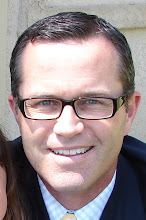When I was in my early 20's, I was searching. When I was in my mid-20's, I was searching. When I hit my late 20's and early 30's, I was still searching. What was I supposed to "do"? What was I supposed to make of my life? How is this thing going to go down? I really didn't know and, though I started to piece it together bit by bit, I lacked the confidence to "go boldly in the direction of my dreams" because the dreams were fuzzy and the path ahead was definitely a scary one.
One of the things that helped get me through the great unknown (or that portion of it anyway) is the following brief essay by James Michener. Shared with me by a dear friend at a crucial time, it became a close companion on the journey. It helped me to realize that my exploration was "normal" and "creative" and that I needed to trust the process. Today, having found my path and the confidence to walk it more purposefully every day, I relish the opportunity to pass the essay along to those who may benefit. Please read it and do the same.
The Lost Years
We all worry about wasting time, about the years sliding past, about what we intend to do with our lives. We shouldn't-for there is a divine irrelevance in the universe that defies calculation. Many men and women win through to a sense of greatness in their lives only by first stumbling and fumbling their way into patterns that gratify them and allow them to utilize their endowments to the maximum.
Actually, I wrote nothing at all until I was forty. This tardy beginning, one might say, stemmed from the fact that I spent a good deal of my early time knocking around this country and Europe trying to find out what I believed in-what values were large enough to enlist my sympathies during what I sensed would be a long and confused life. Had I committed myself at age eighteen as I was encouraged to do, and as we all are encouraged to do, I wouldn't even have known the perimeters of the problem, and any choice I might have made then would have had to be wrong. It took me forty years to find out the facts.
As a consequence, I have never been able to feel anxiety about young people who are fumbling their way toward the enlightenment that will keep them going. I doubt that a young person, unless she wants to become a doctor or a research chemist, in which case a substantial body of specific knowledge must be mastered within a prescribed time, is really capable of wasting time, regardless of what she does. I believe that you have until age thirty-five to decide finally on what you are going to do, and that any exploration that you do in the process will, in the end, turn out to have been creative. Indeed, it may well be that the years that observers describe as wasted will prove to have been the most productive of those insights that will keep you going. The trip to Egypt, the two years spent as a runner for a bank, the spell you spent on the newspaper in Idaho-these are the ways in which a young person ought to spend her life-the ways of waste that lead to true knowledge.
Two more comments. First, I have recently decided that the constructive work of the world is done by an appallingly small percentage of the population. The rest simply don't give a damn or they grow tired, or they fail to acquire when young the ideas that would vitalize them for the long decades. I am not saying that such people don't matter; they are among the most precious items on the earth. But they cannot be depended upon to either generate necessary new ideas or to put them into operation if someone else generates them. Therefore, those men and women who do have the energy to form new constructs and new ways to implement them must do the work of many. I believe it to be an honorable aspiration to want to be among the creators.
Second, I was about forty when I retired from the rat race, having satisfied myself that I could handle it if I had to. I saw then that a person could count their life a success if they survived, merely survived, to age seventy, without having ended up in jail because they could not adjust to the minimum laws that society required, or having landed in the booby hatch because they could not bring their personality into harmony with the personalities of others.
I now believe this without question: Income, position, the opinions of one's friends, the judgments of one's peers, and all the other traditional criteria by which human beings are judged are for the birds. The only question is-can you hang on through the crap they throw at you and not lose your freedom or your good sense. I am now sixty-seven and three quarters and it looks as if I've made it. Whatever happens now is on the house and of no concern to me.
~James A. Michener
Author of Hawaii, Centennial, The Drifters, Adventures in Paradise, and other works.
© 2010 David Berry
Subscribe to:
Post Comments (Atom)

The mark of the immature man is that he wants to die nobly for a cause, while the mark of the mature man is that he wants to live humbly for one. J. D. Salinger
ReplyDelete